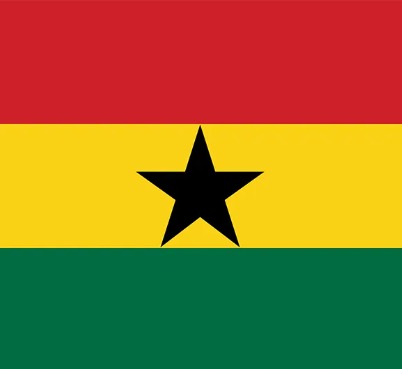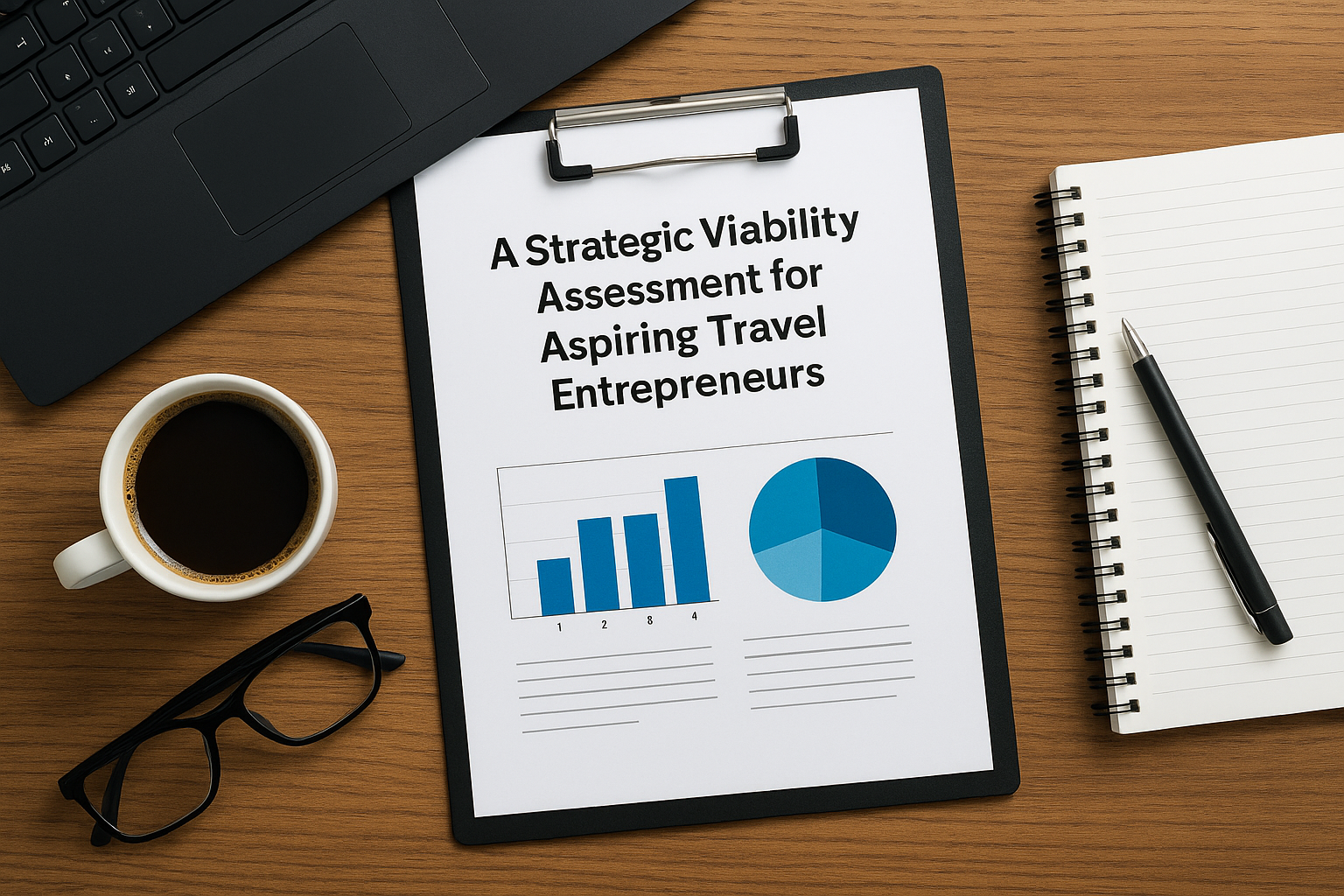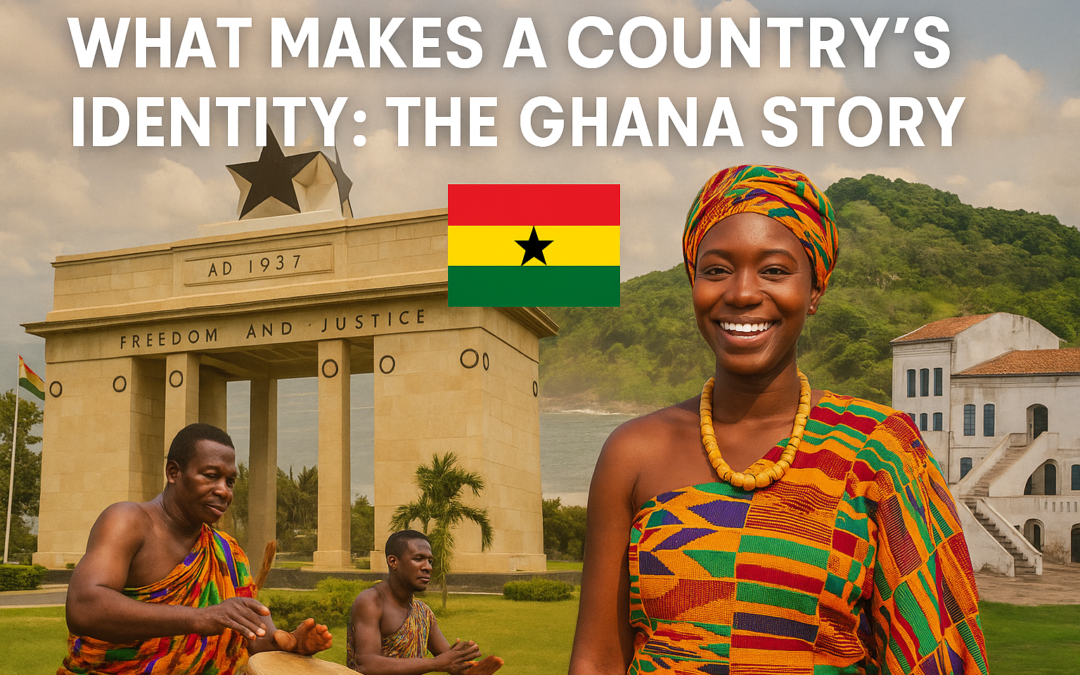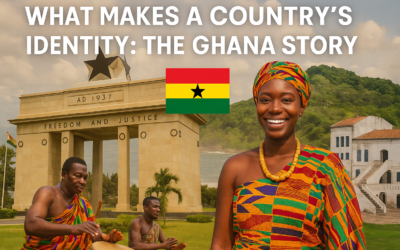I. Executive Summary
Ghana’s tourism sector is currently experiencing a period of robust growth and significant resilience, positioning itself as a compelling, albeit complex, market for entrepreneurial ventures. In 2024, the nation achieved record-breaking tourism revenues of US$4.8 billion and welcomed 1.29 million international visitors, alongside a notable surge in domestic tourism. This upward trajectory is underpinned by strategic government initiatives, burgeoning public-private partnerships, and a concerted effort towards digitalization, all aimed at solidifying tourism as a key economic pillar.
For entrepreneurs considering a travel business in Ghana, the market presents substantial opportunities, particularly within high-value niche segments such as heritage, ecotourism, culinary, medical, and diaspora-focused travel. The increasing demand for authentic and experiential journeys, coupled with governmental support for digital platforms, creates a fertile ground for innovative business models. However, prospective entrants must navigate persistent challenges, including infrastructural deficiencies, the need for consistent service quality improvements, and the operational implications of policies like the Electronic Transfer Levy (E-Levy). Success in this dynamic environment will necessitate meticulous strategic planning, a sharp focus on service excellence, targeted niche specialization, and robust digital integration, coupled with a pragmatic approach to market data and a commitment to sustainable practices.
II. Ghana’s Tourism Sector: A Landscape of Growth and Resilience
Ghana’s tourism industry has demonstrated remarkable vitality and strategic importance to the national economy, particularly in the post-pandemic era. The sector’s performance in recent years underscores its increasing recognition as a significant contributor to economic development and international standing.
Recent Performance and Economic Contribution
The year 2024 marked an unprecedented period for Ghana’s tourism sector. The nation welcomed approximately 1.29 million foreign tourists, a substantial 12% increase from the 1.14 million recorded in 2023. This surge in arrivals translated into record-breaking revenues of US 4.8 billion. This consistent growth, now in its fourth consecutive year following the 2020 contraction, highlights a sustained recovery trajectory and deep market vitality. Beyond international visitors, domestic tourism has also seen robust expansion, with 1.68 million visits to local tourist sites in 2024, representing a 19% year-on-year increase. The hospitality landscape has mirrored this growth, with the number of licensed tourism enterprises expanding from 5,786 in 2023 to 6,702 in 2024, indicating growing private sector confidence and investment.
These compelling figures reinforce tourism’s role as a vital pillar of Ghana’s socio-economic development. The sector significantly contributes to job creation, generates crucial foreign exchange earnings, and enhances the country’s international standing. While the specific percentage contribution of tourism to Ghana’s GDP for 2023-2024 is not explicitly detailed by the World Bank, the reported revenue growth unequivocally points to its escalating importance within the national economy. Ghana’s growing appeal is further evidenced by its increasing recognition as a hub for the African diaspora community and global business travelers. The United States, Nigeria, and the United Kingdom remain the primary source markets, with Nigerian arrivals alone experiencing a remarkable 25% increase. Additionally, cruise tourism has seen notable expansion, with 14 cruise ships docking in Ghana in 2024, bringing over 12,600 passengers a 38% increase over the previous year.
A critical observation from the recent performance data is the indication of a sustained post-pandemic recovery and substantial sectoral momentum. The consistent reporting of “record-breaking growth” and a “strong upward trajectory” across various sources, following a period of robust recovery from the COVID-19 pandemic, suggests that the market is not merely rebounding but is actively expanding. This consistent growth across both international and domestic segments, coupled with an increase in licensed businesses, points to a fundamentally healthy and expanding market. This environment is generally favorable for new ventures, as the demonstrable increase in demand from both international and domestic sources provides a positive macro-environment for entering the travel business. Entrepreneurs can strategically position themselves to capitalize on this overall positive momentum.
However, a closer examination of the reported revenue figures reveals a potential discrepancy that warrants careful consideration. While the US$4.8 billion revenue for 2024 is widely cited, some analyses question the rapid increase in receipts without clear justification from product expansion or pricing shifts. The implied average spend per visitor, at $3,742 in 2024, is noted as unusually high when compared to continental peers like South Africa and Kenya. This suggests that there may be issues with data methodology or verification in certain official reports. For entrepreneurs, this situation necessitates caution. Over-reliance on potentially inflated macro-level figures could lead to unrealistic business plans or misallocation of resources. It underscores the importance of conducting thorough due diligence, focusing on verifiable micro-level market research, and understanding actual customer spending patterns within specific niches, rather than solely depending on aggregated national figures. This also presents an opportunity for businesses to genuinely focus on value creation and service quality to justify premium pricing and higher per-tourist expenditure.
Table 1: Ghana Tourism Key Performance Indicators (2023-2024)
| Indicator | 2023 Value | 2024 Value | Year-on-Year Change | Source Snippets |
| International Arrivals | 1.14 million | 1.29 million | +12% | |
| Domestic Visits to Tourist Sites | 1.41 million | 1.68 million | +19% | |
| Total Tourism Revenue | US$3.81 billion | US$4.8 billion | +27% | |
| Average Tourist Expenditure per Trip | ~$3,200 | $3,742 | +17% | |
| Licensed Tourism Enterprises | 5,786 | 6,702 | +16% | |
| Cruise Passengers | 9,159 | 12,600 | +38% |
Key Growth Drivers
The impressive growth in Ghana’s tourism sector is not accidental but a direct result of concerted efforts and strategic initiatives. Government-led marketing campaigns have played a pivotal role in boosting both arrivals and revenues. Initiatives such as “See Ghana, Eat Ghana, Wear Ghana, Feel Ghana,” “December in GH” (DiGH), “Year of Return,” and “Beyond the Return” have been instrumental in attracting visitors. Notably, the “December in GH” campaign has significantly contributed to international visitors extending their stays, averaging 22 nights and spending over $700 per day, solidifying Ghana’s reputation as a premium heritage and leisure destination.
Public-Private Partnerships (PPPs) have also been crucial in fostering an integrated and memorable travel experience. Collaboration between local businesses, government agencies like the Ghana Tourism Authority (GTA), and international stakeholders has been a cornerstone of this success. The Ministry of Tourism, Arts and Culture (MoTAC) and GTA are committed to promoting innovation, sustainability, and inclusivity through these ongoing partnerships. Furthermore, improvements in workforce development, the proliferation of online communication platforms, and a general enhancement of the tourist experience have contributed significantly to attracting and retaining visitors. The launch of the Ghana Tourism Marketplace by the Ghana Tourism Development Company (GTDC) represents a strategic shift towards digitalizing service delivery, aiming to reduce reliance on foreign booking agencies and empower local operators. This platform is designed to offer real-time booking, facilitate customer feedback, provide data analytics, and offer marketing tools specifically for local businesses. Lastly, event-driven tourism, exemplified by major gatherings like PANAFEST Emancipation, the Kwahu Paragliding Festival, and Dirty December, has substantially contributed to economic activity and employment across various regions.
A significant underlying factor contributing to the sector’s growth is the strategic governmental focus on tourism as a core economic pillar. The consistent emphasis on national campaigns and the explicit statements from MoTAC regarding its objective to “diversify and expand the tourism industry for economic development” and contribute “enormously to Gross Domestic Product (GDP)” demonstrate a deliberate, long-term national strategy. This strategic commitment is further reinforced by the World Bank’s Tourism Development Project (P164211), which aims to enhance tourism performance in targeted destinations. This strong governmental backing creates a more stable and supportive environment for tourism businesses. Entrepreneurs can anticipate continued policy support, sustained marketing efforts, and potential infrastructure improvements, which collectively reduce market entry risks and foster a more predictable operating landscape. This alignment with national objectives also presents opportunities for businesses to access government support or partnership initiatives.
Another critical element shaping the sector’s trajectory is the increasing role of digitalization as a key enabler and competitive advantage. The introduction of the Ghana Tourism Marketplace is explicitly described as a “digital revolution” and a “strategic shift” to modernize service delivery and empower local tourism operators by reducing dependence on foreign booking agencies. This platform’s features, such as real-time booking, online visibility, and built-in analytics, highlight a clear governmental push towards a data-driven, digitally-enabled tourism sector. The emphasis on “leveraging digital innovation” by the GTA CEO and the Deputy Minister’s assertion that “data is the compass guiding Ghana’s strategic decisions” further underscore this commitment. For entrepreneurs, this signals that a robust digital presence and strong digital capabilities are no longer optional but essential for competitiveness. Prioritizing the development of effective online booking systems, implementing sophisticated digital marketing strategies, and actively utilizing platforms like the Ghana Tourism Marketplace will be crucial. This trend also opens avenues for tech-savvy entrepreneurs to offer digital solutions to other tourism businesses or to create entirely new, digitally-native travel experiences. The “zero-cost policy” for operators on the GTDC platform further lowers the barrier to entry for digital adoption, especially for smaller businesses.
III. Untapped Potential: Opportunities for Travel Entrepreneurs
Ghana’s vibrant culture, rich history, and diverse landscapes create a fertile ground for numerous entrepreneurial opportunities within its burgeoning tourism sector. Identifying and capitalizing on specific market segments and emerging trends will be key to success.
Market Demand and Visitor Profiles
International tourists visiting Ghana are driven by a diverse set of motivations. Data indicates that visits are primarily for family and friends (22.29%), holidays (22.15%), study or teaching (7.06%), and business travel (2.43%). Deeper motivations include a desire for cultural immersion, engagement with destination attractions, social contact, and the pursuit of adventure and novelty. There is also a growing interest in authentic culinary experiences, including traditional cooking techniques and indigenous ingredients.
The primary international source markets for Ghana consistently remain the United States, Nigeria, and the United Kingdom. Nigeria, in particular, has shown remarkable growth with a 25% increase in visitors. This strong influx from these countries reflects Ghana’s deep cultural and economic ties, especially with the African diaspora. Concurrently, domestic tourism is robust and expanding, with a 19% increase in visits to local tourist sites in 2024. Popular domestic attractions include the Kwame Nkrumah Memorial Park, Kakum National Park, and Bunso Arboretum.
A significant and enduring aspect of Ghana’s tourism appeal is the powerful draw of diaspora tourism. The “African diaspora community” and government-backed campaigns like “Year of Return” and “Beyond the Return” are consistently highlighted as primary drivers of international arrivals. The strong presence of visitors from the United States, a key source market, directly aligns with the emphasis on “heritage and leisure travel” and the profound desire for “reconnecting with roots”. Initiatives like the “Ancestral Heritage Tour” are explicitly designed as “soul-stirring journeys” for participants to “walk in the footsteps of their ancestors”. This goes beyond mere sightseeing; it represents a deep, emotional connection to a perceived homeland, transforming a visit into a personal pilgrimage. For entrepreneurs, this strong emotional connection translates into a highly motivated and potentially loyal customer base. Businesses specializing in heritage tours, cultural immersion experiences, genealogy services, or even long-stay accommodation tailored for diaspora members are likely to find significant demand. Tailoring marketing and product offerings to this specific demographic, emphasizing narratives of identity, return, and reconnection, will be crucial for capturing this market. This niche also offers opportunities for premium pricing due to the high emotional and personal value attached to the experience.
Furthermore, there is a clear and growing demand for experiential and authentic travel. International tourists are increasingly motivated by a desire for “culture, destination attractions, social contact and adventure-novelty”. The appeal lies in the opportunity to “learn about its history, culture, and landscapes,” and to engage in “distinctive and enriching experiences”. The rising interest in “authentic flavors, traditional cooking techniques, and indigenous ingredients” points to a shift away from passive observation towards active, immersive participation. The sustained success of events like “December in GH” and the focus on “vibrant festivals” further support this trend. This trend indicates that generic tour packages may no longer suffice. Entrepreneurs should focus on crafting unique itineraries that allow visitors to deeply engage with Ghanaian culture, its people, and its natural beauty, moving beyond standard tourist sites. This could involve offering curated experiences such as cooking classes, cultural workshops, community-based tours, or guided historical explorations that provide a deeper, more personal connection to the destination.
Niche Market Exploration
Ghana offers a rich tapestry of niche tourism opportunities that aspiring entrepreneurs can leverage:
- Heritage Tourism: Ghana is a prominent destination for heritage tourism, particularly due to its historical slave forts and castles, such as Cape Coast and Elmina. The “Year of Return” and “Beyond the Return” campaigns have significantly amplified this segment, drawing a global diaspora seeking ancestral connections.
- Ecotourism and Adventure Travel: The country possesses substantial potential in ecotourism, with attractions like Kakum National Park (renowned for its canopy walkway), Mole National Park (wildlife), Wli Waterfalls, Bunso Arboretum, and Mount Afadjato (offering hiking and paragliding opportunities). The Kwahu Paragliding Festival stands out as a key event in this domain.
- Cultural and Culinary Tourism: Ghana’s vibrant festivals and rich local cuisine are strong attractions. While culinary tourism possesses significant potential, it remains largely underdeveloped, representing a notable market gap and a “crucial need for strategic interventions”. Encouragingly, remittances from the diaspora are already contributing to the support of local food businesses and festivals, signaling a nascent but promising growth area.
- Business/MICE Tourism: Accra is actively positioning itself as a key hub for meetings, incentives, conferences, and exhibitions (MICE) in the West African sub-region. Business travel constituted nearly 30% of visitors in 2021, and hotels are increasingly adapting to cater to the specific needs of business travelers.
- Emerging Niches:
- Accessible Tourism: This market segment is globally recognized as an underserved opportunity, offering both ethical and significant financial gains for destinations that cater to travelers with disabilities.
- Medical Tourism: Ghana has ambitions to become West Africa’s hub for medical tourism. The average medical tourist spends approximately US5,000,whichissubstantiallyhigherthanthegeneraltouristaverageofUS1,200. The African Medical Tourism Council (AMTC) is actively working to develop this niche through collaborative efforts between government and the private sector.
The prevalence of these high-value niche markets represents strategic entry points for new businesses. The significantly higher average spend of a medical tourist compared to a general tourist, for instance, immediately highlights medical tourism as a particularly lucrative niche. Similarly, Ghana’s status as a “premium destination” for heritage and leisure travel, coupled with extended stays during events like “December in GH,” suggests that visitors in these segments are willing to allocate more resources to their experiences. The identified “underdeveloped” but “significant potential” of culinary tourism, already receiving support from diaspora remittances, further points to a ripe area for specialized investment. Accessible tourism, globally recognized as an “underserved market” with both ethical and financial benefits, also presents a compelling opportunity. This implies that instead of attempting to compete across the broad, established travel market, new entrepreneurs can achieve greater success and higher profit margins by specializing in these high-value or underserved niches. This approach allows for less direct competition and the ability to cater to specific, often more affluent or dedicated, traveler segments, such as bespoke medical travel packages, specialized culinary tours, or accessible tours for travelers with specific needs.
Furthermore, there is a clear emphasis on community-based tourism and sustainability as a potential differentiator. The Ghana Tourism Authority (GTA) actively promotes “sustainable tourism practices from eco-tourism and community-based initiatives,” with a stated goal of ensuring that “tourism development benefits local communities and protects our natural and cultural heritage”. Similarly, Diaspora Affairs Ghana explicitly designs its eco-tourism adventures to connect visitors with nature and heritage “while contributing to community-based tourism initiatives”. This aligns with a growing global trend among travelers who seek responsible and impactful travel experiences. For entrepreneurs, integrating community engagement and sustainable practices directly into their business models can create a strong competitive advantage. This could involve direct partnerships with local communities for tour operations, prioritizing the sourcing of local goods and services, employing local guides, or dedicating a portion of profits to community development or conservation efforts. Such an approach not only aligns with national tourism objectives but also enhances brand reputation and provides unique, authentic experiences that resonate with the conscious traveler.
Enabling Environment and Digitalization
Ghana’s government has demonstrated a clear commitment to fostering a supportive environment for tourism growth. The Ministry of Tourism, Arts and Culture (MoTAC) and the Ghana Tourism Authority (GTA) are actively developing the sector with the ambitious goal of making it the country’s primary foreign exchange earner. This strategic direction is formalized through initiatives like the 15-year National Tourism Development Plan (2013-2027) and the expanded responsibilities of the GTA. Complementing these national efforts, the World Bank’s Ghana Tourism Development Project (P164211) is actively supporting the strengthening of the tourism enabling environment, which includes crucial aspects such as industry training, skills development, aviation policy, and visa facilitation.
Recent visa reforms further underscore the government’s proactive stance on accessibility. Ghana introduced a visa-on-arrival policy from December 2024 to January 2025, a measure that significantly boosted international arrivals during the festive holiday period. Organizations like Diaspora Affairs Ghana also offer streamlined visa-on-arrival services, further easing entry for visitors.
A transformative development in the sector is the strategic embrace of digital platforms. The Ghana Tourism Marketplace, launched by the Ghana Tourism Development Company (GTDC), is a comprehensive digital platform designed to connect local service providers—including hotels, tour operators, and guides—directly with international travelers. This initiative aims to reduce the sector’s reliance on foreign Online Travel Agencies (OTAs) and empower local businesses by providing tools for real-time booking, customer reviews, data analytics, and marketing.
The government’s proactive stance on accessibility and digital empowerment is a significant advantage for aspiring entrepreneurs. The introduction of the visa-on-arrival policy is a direct government action to “improve accessibility and reduce travel barriers” for international visitors. This, combined with the strategic launch of the Ghana Tourism Marketplace, which explicitly aims to “reduce reliance on foreign booking agencies, and empower local tourism operators,” demonstrates a clear, top-down strategy to make Ghana more accessible and to enable local businesses to compete effectively in the digital realm. The GTDC’s “zero-cost policy” for operators on this platform further lowers the financial barrier to entry for digital adoption, particularly for smaller businesses. These initiatives collectively reduce operational hurdles and market entry barriers for entrepreneurs. New businesses can directly leverage the simplified visa processes to attract a broader international clientele and utilize the Ghana Tourism Marketplace to gain online visibility and booking capabilities without incurring prohibitive initial costs. This supportive regulatory environment for digital innovation signals a favorable landscape for tech-driven travel ventures.
IV. Navigating the Terrain: Challenges and Risks
While Ghana’s tourism sector offers significant opportunities, aspiring entrepreneurs must also be acutely aware of the inherent challenges and risks that could impact business viability and operational success. A realistic assessment of these hurdles is crucial for developing robust business strategies.
Infrastructure and Service Quality Gaps
One of the most pressing challenges facing Ghana’s tourism sector is the inadequacy of its infrastructure, particularly road networks. There are persistent concerns regarding “inadequate access to some tourism sites,” primarily attributed to poor road conditions. The quality of roads in Ghana was rated at a low 3.00 on a scale of 1-7 in 2019, falling below the global average of 4.07, and has shown a declining trend. Calls for enhanced road infrastructure to bolster tourism are frequent and urgent. Beyond roads, the Ghana Tourism Federation (GHATOF) has highlighted broader issues with the “deplorable nature of some of our tourism infrastructure,” “inadequate investment” in the sector, and “poor tourism support services at our sites”.
Complementing infrastructural concerns is the recognized need for improved service quality. Despite a high overall satisfaction rate reported by visitors (78% describing their stay as ‘excellent’) , industry stakeholders, including the Deputy Minister of Tourism, Culture, and Creative Arts, acknowledge a “need for improved customer services” and a “lack of professionalism and service quality” within the sector. This suggests that while Ghana’s inherent appeal is strong, the consistency and professionalism of service delivery can be inconsistent. Furthermore, domestic connectivity remains limited. While major cities like Accra, Kumasi, Tamale, and Takoradi are connected by domestic flights, the overall flight network is not extensive, with no flights to certain regions like Ho. This can complicate the logistics and efficiency of multi-region itineraries for tour operators.
The state of infrastructure serves as a significant bottleneck for the scalability of tourism businesses and the overall customer experience. Consistent complaints about “inadequate access to some tourism sites” and “poor road infrastructure” directly imply that even with growing tourist demand, reaching certain attractions can be difficult, time-consuming, and uncomfortable for visitors. This directly impacts travel time, passenger comfort, and overall visitor satisfaction. The limited domestic flight network further restricts efficient multi-destination travel within Ghana, potentially limiting the scope of comprehensive tour packages. For entrepreneurs, this means that business planning must explicitly account for these infrastructural limitations, potentially requiring higher budgets for robust vehicles, allocating longer travel times, or strategically focusing on more easily accessible destinations. While this presents an operational challenge that can affect service delivery and customer reviews, it also highlights an opportunity for specialized transport services or for entrepreneurs to consider investing in improving localized infrastructure in high-potential but underserved areas.
Moreover, service quality emerges as a critical area for differentiation and investment. The explicit acknowledgment of the “need for improved customer services” and a “lack of professionalism and service quality” by both the Deputy Minister and the Ghana Tourism Federation indicates a recognized gap in the industry. This suggests that while visitors generally enjoy their time in Ghana, there is considerable room for improvement in the actual delivery of services. For new entrants, this represents a significant opportunity to gain a competitive advantage. Investing heavily in comprehensive staff training, professional development (e.g., certified tour guides), and establishing consistently high service standards can set a business apart. Businesses that prioritize exceptional customer service will likely stand out in the market, fostering positive word-of-mouth referrals, encouraging repeat business, and achieving higher customer satisfaction scores, thereby building a strong brand reputation.
Regulatory and Operational Considerations
Operating a travel business in Ghana requires adherence to specific regulatory frameworks. The Ghana Tourism Authority (GTA) outlines a clear, three-phase process for obtaining a license: initial business registration, followed by an inspection and assessment phase, and finally, the issuance of an operational license. These processes are governed by specific regulations, such as the Travel Trade Enterprise Regulations (LI 2389).
A notable operational consideration is the impact of the 1.5% Electronic Transfer Levy (E-Levy), introduced in May 2022. This levy applies to various electronic transactions, including mobile money payments, bank transfers, merchant payments, and inward remittances. The introduction of the E-Levy has had a discernible effect on digital payment behavior, leading to a 25% reduction in mobile money service usage and a 35% fall in transaction values, with many consumers reportedly reverting to cash-based transactions. The levy is widely perceived by Ghanaians as a “curse” that diminishes their inclination to use electronic transactions and can negatively impact business income by increasing operational expenses. While exemptions exist for merchant payments made to businesses registered with the Ghana Revenue Authority (GRA), the broader negative perception and shift away from mobile money could still affect tourism businesses that rely on digital payment channels from customers.
The E-Levy presents a distinct disincentive for digital payments in business operations. The direct taxation of electronic transactions, including mobile money and merchant payments, has led to a significant decrease in mobile money usage and transaction values, prompting a noticeable shift back to cash transactions. This consumer behavior directly impacts tourism businesses that might prefer digital payment solutions for efficiency and transparency. Ghanaians’ negative perception of the levy, viewing it as an additional burden that reduces disposable income and adversely affects business profits, means that even with exemptions for GRA-registered businesses for merchant payments, the general reluctance to use mobile money could still influence customer payment preferences. For entrepreneurs, this implies that businesses relying heavily on mobile money transactions for customer payments may face increased operational costs or a strong preference from customers for cash, potentially hindering efficient financial management and transparency. It becomes imperative for entrepreneurs to explore diverse payment solutions that minimize the E-Levy’s impact, clearly communicate payment options to customers, and strategically leverage the merchant payment exemption by ensuring proper GRA registration. This situation suggests that a hybrid payment approach, incorporating cash, card, and mobile money, might be necessary to cater to diverse customer preferences and navigate the current payment landscape effectively.
Market Dynamics and Competition
The market dynamics in Ghana’s tourism sector present both opportunities and challenges. As previously noted, concerns about data credibility, particularly regarding the rapid increase in reported revenue ($4.82 billion in 2024 from 1.29 million arrivals) without clear justification for the implied per-visitor spend, raise questions about the reliability of some official statistics. This lack of granular, verified data, as highlighted by the Ghana Investment Promotion Centre (GIPC) CEO regarding the “lack of reliable data needed to make informed investment decisions,” creates a challenging environment for accurate market analysis and strategic planning.
The competitive landscape is also evolving. The hospitality sector witnessed a notable increase in licensed tourism enterprises, from 5,786 in 2023 to 6,702 in 2024, indicating a growing number of players in the market. Prominent local travel agencies include award-winners like Jubilee Travel & Tours, along with Secure Travel and Tours, Adansi Travels, Easy Travel Consult, FCM Travel, and Travel Time Africa. While these local entities are significant, the global Online Travel Agencies (OTAs) command a substantial market share, capturing 40% of the global travel market, and travelers worldwide are increasingly using websites and mobile apps for bookings. This global digital dominance presents both a threat and an opportunity for local businesses.
The dual challenge of data reliability and market transparency significantly impacts an entrepreneur’s ability to conduct accurate market assessments. The critique regarding Ghana’s reported tourism revenue and per-tourist spend suggests that official statistics may lack the desired robustness, making it difficult to gauge true market potential and competitive intensity. This absence of verified, granular data, as underscored by the GIPC CEO’s concerns about the “lack of reliable data needed to make informed investment decisions,” creates an environment where market analysis is inherently more challenging. This implies that entrepreneurs cannot solely rely on macro-level government reports for their business planning. Instead, they will need to invest in their own micro-market research, conduct thorough feasibility studies, and actively gather primary data to accurately understand actual customer spending patterns, competitive pricing strategies, and the true demand within their specific niche. While this increases the initial effort and cost of market entry, it is an indispensable step for making sound, data-driven business decisions and mitigating risks associated with potentially inflated market perceptions.
Sustainability and Investment Hurdles
Ghana’s tourism sector faces challenges related to sustainable development and investment. A key issue is the “limited private investment in high-value production” within the sector, suggesting a gap in funding for more sophisticated tourism products and experiences. This underinvestment is often compounded by regional disparities in tourism development, where growth and infrastructure are not evenly distributed across the country. Investment tends to be concentrated in urban centers, leading to uneven development and underutilized potential in rural areas.
Ecotourism, despite its immense potential, faces specific challenges. These include the marginalization of local communities, a dependence on international forces for development, and the undervaluation of local ecological knowledge. Furthermore, coastal communities, which hold significant ecotourism potential, are grappling with severe environmental threats such as sea erosion, marine and coastal pollution, and overfishing. These issues not only impact the environmental integrity but also undermine the socio-economic well-being of these communities.
Despite these hurdles, there are concerted government initiatives to stimulate investment. The World Bank’s Ghana Tourism Development Project (P164211) was designed to improve tourism performance in targeted destinations. This project included a US4milliongrantswindowspecificallyforsmallerprivatesectorsiteupgradesandanadditionalUS5 million allocated for SME support, indicating a recognized need for private capital injection. Moreover, the government has launched an initiative to decentralize investment opportunities through a “data-driven, district-by-district roadmap,” aiming to guide both local and international investors to areas where opportunities are most needed.
The sector currently presents a paradox of untapped potential alongside underinvestment in high-value products. While Ghana’s tourism sector is experiencing rapid growth and boasts diverse attractions, there is a recognized “limited private investment in high-value production”. This creates a significant gap between the potential for developing premium, sophisticated tourism experiences and the actual offerings available in the market. The World Bank’s project, which includes grants for private sector and SME support, explicitly acknowledges this need for more private capital to develop high-quality tourism products. This situation signals a substantial opportunity for entrepreneurs who are willing to invest in developing unique, high-quality, and value-added tourism products and services. Rather than focusing on basic offerings, aiming for premium experiences, luxury accommodations, or specialized tours can attract higher-spending tourists and potentially yield superior returns. Entrepreneurs might also explore avenues for accessing available grants or forming strategic partnerships with government initiatives aimed at boosting private investment in specific, high-potential regions or niches. This approach can help bridge the investment gap while capitalizing on the market’s growing demand for elevated experiences.
V. Strategic Pathways for Success: Recommendations for Entrepreneurs
For entrepreneurs considering entry into Ghana’s travel business, a strategic approach that leverages opportunities while mitigating risks is essential. The following recommendations provide a roadmap for navigating this dynamic landscape.
Targeting High-Potential Niches
To maximize success, entrepreneurs should move beyond generic travel offerings and specialize in high-potential niche markets. Ghana’s strong appeal to the African diaspora presents a prime opportunity for developing authentic heritage tours, cultural immersion programs, and “roots tourism” packages. Businesses can offer unique, experiential activities such as traditional cooking classes , guided visits to local festivals, and immersive community tours, fostering genuine connections for visitors.
Furthermore, exploring emerging high-value niches can yield significant returns. Medical tourism, with its substantially higher average spend per visitor, represents a lucrative, albeit complex, area for specialized services. Similarly, accessible tourism, identified globally as an underserved market, offers both ethical and financial potential for businesses catering to travelers with specific accessibility needs. In the realm of ecotourism, a focus on sustainable and community-based initiatives is crucial. This approach not only aligns with national goals for environmental preservation and local community benefit but also appeals to a growing segment of conscious travelers. Partnerships with local communities around key sites like Kakum National Park, Mole National Park, or Wli Waterfalls can ensure mutual benefit and authentic experiences.
Leveraging Digital Innovation
A robust digital strategy is no longer optional but a fundamental requirement for competitiveness in Ghana’s travel sector. Entrepreneurs must establish a strong online presence through professional, user-friendly websites, active social media engagement, and by maximizing visibility on platforms like the Ghana Tourism Marketplace. Utilizing digital tools for real-time booking, collecting customer feedback, and conducting data analytics will be critical for operational efficiency and continuous improvement.
While the E-Levy presents a challenge to mobile money adoption, this payment method remains prevalent. Entrepreneurs should strategically understand the levy’s exemptions for registered businesses and ensure proper GRA registration to minimize its impact on merchant payments. Offering diverse payment options—including card, traditional bank transfers, and carefully managed mobile money—will cater to varied customer preferences. Furthermore, investing in targeted digital marketing campaigns is essential to reach key source markets such as the United States, Nigeria, and the United Kingdom, as well as specific diaspora communities, leveraging the power of online reach to attract and convert potential clients.
Enhancing Service Excellence
To differentiate in a growing market, prioritizing exceptional service quality is paramount. Entrepreneurs should invest in comprehensive training programs for all staff, focusing on professionalism, hospitality, and cultural sensitivity. Developing and employing professional, knowledgeable, and engaging tour guides who can authentically narrate Ghana’s rich history and culture will significantly enhance the visitor experience. Implementing robust systems for collecting and analyzing customer feedback is also crucial, allowing businesses to identify areas for improvement in service delivery and product offerings continuously.
Building Strategic Partnerships
Collaborative efforts are vital for sustainable success. Entrepreneurs should work closely with government bodies such as the Ghana Tourism Authority (GTA) and the Ministry of Tourism, Arts and Culture (MoTAC) to align their business models with national tourism development plans. This collaboration can facilitate access to government support, marketing initiatives, and policy guidance.
For businesses focused on ecotourism and cultural experiences, building strong, equitable partnerships with local communities is essential. Such partnerships ensure mutual benefit, foster authentic experiences, and contribute to the long-term sustainability of tourism initiatives. Additionally, forging alliances with reputable hospitality providers (hotels, guesthouses) and reliable transportation companies is critical to ensure seamless and comfortable travel experiences for clients, especially given the existing infrastructural challenges in Ghana.
Navigating Regulatory Compliance
Understanding and adhering to the regulatory framework is a non-negotiable aspect of establishing a travel business. Entrepreneurs must meticulously follow the Ghana Tourism Authority’s three-phase process for business registration, inspection, and licensing. Ensuring full compliance with relevant regulations, such as the Travel Trade Enterprise Regulations (LI 2389), is imperative to avoid legal complications and ensure smooth operations. Seeking expert guidance from local legal and business advisors is highly recommended to navigate the regulatory landscape effectively and ensure all compliance requirements are met.
Table 2: Essential Regulatory Steps for Travel Businesses in Ghana
| Phase | Description | Key Activities & Regulations | Source Snippets |
| Phase 1 | Registration | Register your business and key personnel online. This is the initial step to formally establish the business entity. | |
| Phase 2 | Inspection and Assessment | A team of professionals from the Ghana Tourism Authority (GTA) will inspect the business premises and operations. They will assess compliance with necessary permits and offer advice based on specific business needs. | |
| Phase 3 | Licensing | Upon satisfying all necessary requirements and passing the inspection, an operational license will be issued. This license enables the business to legally carry out its travel-related activities. Key regulations include the Travel Trade Enterprise Regulations (LI 2389). |
VI. Conclusion: A Calculated Venture
The Ghanaian travel and tourism sector presents a compelling landscape for entrepreneurial consideration. The sector’s record-breaking performance in 2024, characterized by significant increases in international arrivals, domestic visits, and revenue, underscores a robust post-pandemic recovery and sustained growth momentum. This growth is actively fostered by strategic government initiatives, including targeted marketing campaigns and efforts to digitalize the industry, alongside burgeoning public-private partnerships. These factors collectively create a supportive environment ripe with opportunities, particularly within high-value and emerging niche markets such as heritage, ecotourism, culinary, medical, and diaspora tourism. The increasing demand for authentic, experiential travel further amplifies these prospects.
However, the path to success is not without its challenges. Entrepreneurs must realistically account for existing infrastructural deficiencies, particularly in road networks, which can impact accessibility and the overall tourist experience. The need for consistent improvement in service quality across the sector presents both a challenge and a significant opportunity for differentiation. Furthermore, navigating the regulatory landscape, including the specific licensing requirements and the operational implications of the E-Levy on digital payments, demands careful planning. The presence of data credibility concerns also necessitates thorough independent market research to inform sound business decisions.
Ultimately, starting a travel business in Ghana is a viable and potentially rewarding endeavor for entrepreneurs who adopt a calculated and well-informed approach. Success will hinge on a clear strategic focus on high-potential niches, a proactive embrace of digital innovation, an unwavering commitment to service excellence, and the cultivation of strong partnerships with both government entities and local communities. By meticulously addressing these strategic pathways, entrepreneurs can effectively leverage Ghana’s growing tourism appeal and contribute to its continued development, transforming promising market conditions into sustainable business success.











0 Comments